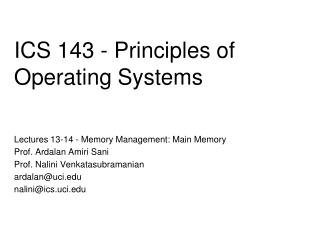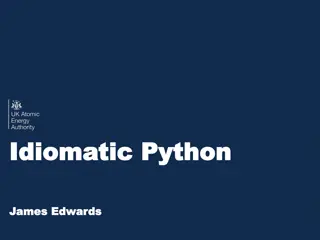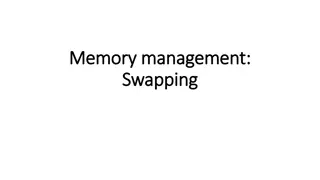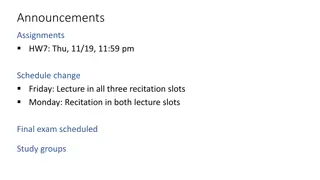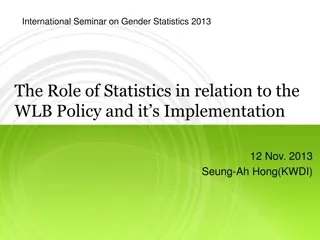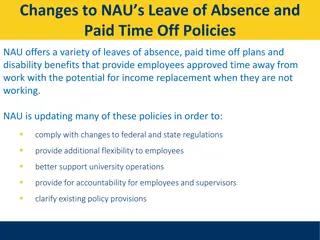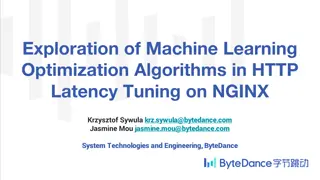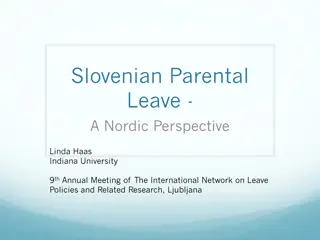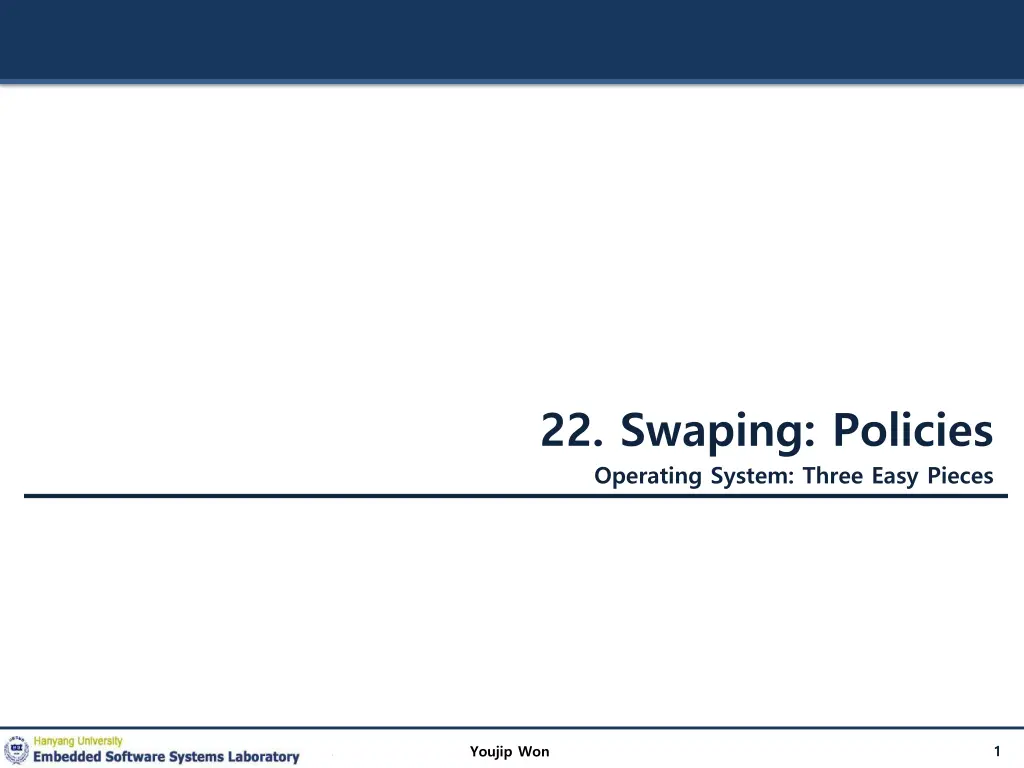
Understanding Memory Management Policies in Operating Systems
Explore how memory management policies impact system performance, from swapping to cache management. Learn about optimal replacement policies, FIFO, and Belady's Anomaly. Discover the significance of eviction decisions in enhancing system efficiency.
Download Presentation

Please find below an Image/Link to download the presentation.
The content on the website is provided AS IS for your information and personal use only. It may not be sold, licensed, or shared on other websites without obtaining consent from the author. If you encounter any issues during the download, it is possible that the publisher has removed the file from their server.
You are allowed to download the files provided on this website for personal or commercial use, subject to the condition that they are used lawfully. All files are the property of their respective owners.
The content on the website is provided AS IS for your information and personal use only. It may not be sold, licensed, or shared on other websites without obtaining consent from the author.
E N D
Presentation Transcript
22. Swaping: Policies Operating System: Three Easy Pieces 1 Youjip Won
Beyond Physical Memory: Policies Memory pressure forces the OS to start paging out pages to make room for actively-used pages. Deciding which page to evict is encapsulated within the replacement policy of the OS. 2 Youjip Won
Cache Management Goal in picking a replacement policy for this cache is to minimize the number of cache misses. The number of cache hits and misses let us calculate the average memory access time(AMAT). ???? = ???? ?? + (????? ??) Arguement Meaning The cost of accessing memory The cost of accessing disk The probability of finding the data item in the cache(a hit) The probability of not finding the data in the cache(a miss) ?? ?? ???? ????? 3 Youjip Won
The Optimal Replacement Policy Leads to the fewest number of misses overall Replaces the page that will be accessed furthest in the future Resulting in the fewest-possible cache misses Serve only as a comparison point, to know how close we are to perfect 4 Youjip Won
Tracing the Optimal Policy Reference Row 0 1 2 0 1 3 0 3 1 2 1 Access 0 1 2 0 1 3 0 3 1 2 1 Hit/Miss? Miss Miss Miss Hit Hit Miss Hit Hit Hit Miss Hit Evict Resulting Cache State 0 0,1 0,1,2 0,1,2 0,1,2 0,1,3 0,1,3 0,1,3 0,1,3 0,1,2 0,1,2 2 3 ???? Hit rate is Future is not known. ????+??????= ??.?% 5 Youjip Won
A Simple Policy: FIFO Pages were placed in a queue when they enter the system. When a replacement occurs, the page on the tail of the queue(the First-in pages) is evicted. It is simple to implement, but can t determine the importance of blocks. 6 Youjip Won
Tracing the FIFIO Policy Reference Row 0 1 2 0 1 3 0 3 1 2 1 Access 0 1 2 0 1 3 0 3 1 2 1 Hit/Miss? Miss Miss Miss Hit Hit Miss Miss Hit Miss Miss Hit Evict Resulting Cache State 0 0,1 0,1,2 0,1,2 0,1,2 1,2,3 2,3,0 2,3,0 3,0,1 0,1,2 0,1,2 0 1 3 Even though page 0 had been accessed a number of times, FIFO still kicks it out. ???? Hit rate is ????+??????= ??.?% 7 Youjip Won
BELADYS ANOMALY We would expect the cache hit rate to increase when the cache gets larger. But in this case, with FIFO, it gets worse. Reference Row 1 2 3 4 1 2 5 1 2 3 4 5 14 12 Page Fault Count 10 8 6 4 2 0 1 2 3 4 5 6 7 Page Frame Count 8 Youjip Won
Another Simple Policy: Random Picks a random page to replace under memory pressure. It doesn t really try to be too intelligent in picking which blocks to evict. Random does depends entirely upon how lucky Random gets in its choice. Access 0 1 2 0 1 3 0 3 1 2 1 Hit/Miss? Miss Miss Miss Hit Hit Miss Miss Hit Miss Hit Hit Evict Resulting Cache State 0 0,1 0,1,2 0,1,2 0,1,2 1,2,3 2,3,0 2,3,0 2,0,1 2,0,1 2,0,1 0 1 3 9 Youjip Won
Random Performance Sometimes, Random is as good as optimal, achieving 6 hits on the example trace. 50 40 Frequency 30 20 10 0 1 2 3 4 5 6 Number of Hits Random Performance over 10,000 Trials 10 Youjip Won
Using History Lean on the past and use history. Two type of historical information. Historical Information Meaning Algorithms The more recently a page has been accessed, the more likely it will be accessed again If a page has been accessed many times, It should not be replcaed as it clearly has some value recency LRU frequency LFU 11 Youjip Won
Using History : LRU Replaces the least-recently-used page. Reference Row 0 1 2 0 1 3 0 3 1 2 1 Access 0 1 2 0 1 3 0 3 1 2 1 Hit/Miss? Miss Miss Miss Hit Hit Miss Hit Hit Hit Miss Hit Evict Resulting Cache State 0 0,1 0,1,2 1,2,0 2,0,1 0,1,3 1,3,0 1,0,3 0,3,1 3,1,2 3,2,1 2 0 12 Youjip Won
Workload Example : The No-Locality Workload Each reference is to a random page within the set of accessed pages. Workload accesses 100 unique pages over time. Choosing the next page to refer to at random The No-Locality Workload 100% 80% When the cache is large enough to fit the entire workload, it also doesn t matter which policy you use. Hit Rate 60% OPT LRU FIFO RAND 40% 20% 80 40 100 60 20 Cache Size (Blocks) 13 Youjip Won
Workload Example : The 80-20 Workload Exhibits locality: 80% of the reference are made to 20% of the page The remaining 20% of the reference are made to the remaining 80% of the pages. The 80-20 Workload 100% 80% LRU is more likely to hold onto the hot pages. Hit Rate 60% OPT LRU FIFO RAND 40% 20% 80 40 100 60 20 Cache Size (Blocks) 14 Youjip Won
Workload Example : The Looping Sequential Refer to 50 pages in sequence. Starting at 0, then 1, up to page 49, and then we Loop, repeating those accesses, for total of 10,000 accesses to 50 unique pages. The Looping-Sequential Workload 100% 80% Hit Rate 60% OPT LRU FIFO RAND 40% 20% 80 40 100 60 20 Cache Size (Blocks) 15 Youjip Won
Implementing Historical Algorithms To keep track of which pages have been least-and-recently used, the system has to do some accounting work on every memory reference. Add a little bit of hardware support. 16 Youjip Won
Approximating LRU Require some hardware support, in the form of a use bit Whenever a page is referenced, the use bit is set by hardware to 1. Hardware never clears the bit, though; that is the responsibility of the OS Clock Algorithm All pages of the system arranges in a circular list. A clock hand points to some particular page to begin with. 17 Youjip Won
Clock Algorithm The algorithm continues until it finds a use bit that is set to 0. A B H Use bit 0 1 Meaning Evict the page G C Clear Use bit and advance hand F D E The Clock page replacement algorithm When a page fault occurs, the page the hand is pointing to is inspected. The action taken depends on the Use bit 18 Youjip Won
Workload with Clock Algorithm Clock algorithm doesn t do as well as perfect LRU, it does better then approach that don t consider history at all. The 80-20 Workload 100% 80% Hit Rate 60% OPT LRU Clock FIFO RAND 40% 20% 80 60 40 100 20 Cache Size (Blocks) 19 Youjip Won
Considering Dirty Pages The hardware include a modified bit (a.k.a dirty bit) Page has been modified and is thus dirty, it must be written back to disk to evict it. Page has not been modified, the eviction is free. 20 Youjip Won
Page Selection Policy The OS has to decide when to bring a page into memory. Presents the OS with some different options. 21 Youjip Won
Prefetching The OS guess that a page is about to be used, and thus bring it in ahead of time. Page 1 is brought into memory Page n Page 3 Page 4 Page 5 Physical Memory Page 1 Page 2 Page 3 Page 4 Secondary Storage Page 2 likely soon be accessed and thus should be brought into memory too 22 Youjip Won
Clustering, Grouping Collect a number of pending writes together in memory and write them to disk in one write. Perform a single large write more efficiently than many small ones. Pending writes Page n Page 1 Page 2 Page 3 Page 4 Page 5 Physical Memory write in one write Page 1 Page 2 Page 3 Page 4 Secondary Storage 23 Youjip Won
Thrashing Memory is oversubscribed and the memory demands of the set of running processes exceeds the available physical memory. Decide not to run a subset of processes. Reduced set of processes working sets fit in memory. CPU Utilization Trashing Degree of multiprogramming 24 Youjip Won
Disclaimer: This lecture slide set was initially developed for Operating System course in Computer Science Dept. at Hanyang University. This lecture slide set is for OSTEP book written by Remzi and Andrea at University of Wisconsin. 25 Youjip Won

